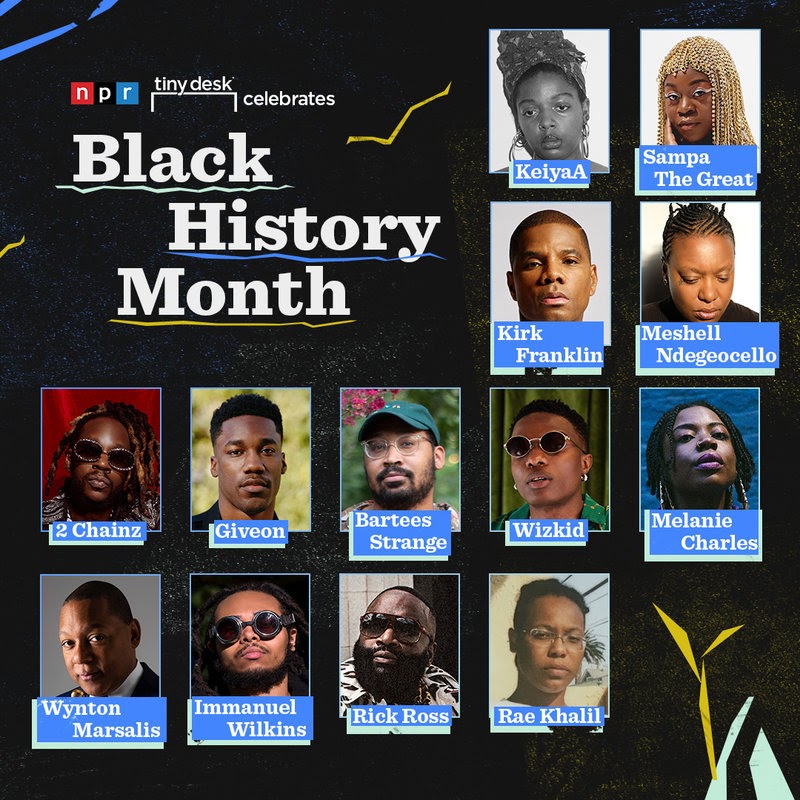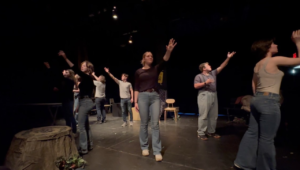NPR Hosts Tiny Desk Concert Series for Black History Month

Image courtesy of National Public Radio
By Caroline Morris
Black Americans have a rich history in the music scene. From a melding of international styles to genres born in the United States, the community has in many ways changed and innovated music. Black History Month is a time not only to celebrate the figures who have changed the history of America, but also those who have and continue to influence the culture of music.
This year, National Public Radio (NPR) is celebrating Black History Month by doing a special four-week series of Tiny Desk Concerts by Black artists.
“The lineup includes both emerging and established artists who will be performing a Tiny Desk concert for the first time. This celebration highlights the beautiful cornucopia of Black music and our special way of presenting it,” said NPR’s Abby O’Neill.
Thus far, the series has included seven artists: Wynton Marsalis and the Jazz At Lincoln Center Orchestra Septet (JLCO), Immanuel Wilkins, Melanie Charles, GIVĒON, Meshell Ndegeocello, and KeiyaA.
Marsalis and the JLCO Septet kicked off the series on February 2 by performing a jazz concert for Tiny Desk.
The group performs three songs, “Sloganize, Patronize, Realize, Revolutionize (Black Lives Matters),” “Deeper Than Dreams,” and “That Dance We Do (That You Love Too).” Each one of these pieces clearly demonstrates the talent of the seven member group, each instrument having its moment to shine in the classic give and take of jazz.
But these songs also step into the modern day with their messages. Marsalis explains how each of these songs relates to different realities from the past year. From Black Lives Matter protests to the lives lost to COVID-19, these musicians capture it all, and wrap up with a funky piece “for everybody who got out and got down during this time on behalf of freedom.”
The jazz theme continues with Immanuel Wilkins being the next guest honored by Tiny Desk. Wilkins plays with only three others, but despite the smaller group the music is no less powerful.
The three songs performed run the gambit in style and tone. “Grace and Mercy” is an emotional journey into which the listener cannot help being swept up. “Warriors” can only be described as fiery with a rapid pace and crashing sound. The final song, “The Dreamer,” is a delicate ending to the concert, coming to a close with the piano sounding as though it is releasing its held breath.
The saxophone is featured most prominently in this concert as it is the instrument Wilkins wields, and does so most elegantly. It is particularly powerful in “The Dreamer,” when Wilkins’ entrance on the sax sounds more like singing than playing in its heartrending croon, making the listener tear up.
The final jazz performance for Tiny Desk was given by Melanie Charles. Charles is definitely experimental, with her sound flowing from jazz to soul to Haitian and back again, all while incorporating electronics.
Charles’ performance is hypnotizing as she begins with “Damballa Wedo,” a song that explores her Haitian roots. Yet, she makes jarring choices with her voice as she sings, with her vocals being an instrument yet to be featured in the Black History Month series, as she almost yelps as she jumps across the scale while supported by her fellow musicians.
Her other two pieces are “Deep River” and “The Dilemma.” “Deep River” truly allows Charles’ voice to shine as she sings a cappella, with the other instruments coming in only once Charles transitions to the flute. She finishes with “The Dilemma,” an anthem of hope that is meant to “remember how vibrant we are, despite what we as Black people had to deal with in 2020.”
The series then moves into a more modern sphere with R&B singer-songwriter GIVĒON. GIVĒON recently gained fame in 2020 from a feature on Drake’s single “Chicago Freestyle.”
While the other concerts for Black History Month have had a strong focus on jazz and instruments, GIVĒON’s contemporary songs showcase his voice.
GIVĒON’s first song, “THE BEACH,” has an almost seductive quality in both the sultry accompaniment and the singer’s silky vocal stylings. What is impressive about GIVĒON’s style is that he can hold a clean single note, the power of which many musicians have forgotten, and still execute flawless runs at the ends of his line to keep
listeners on their toes.
GIVĒON definitely takes this Tiny Desk Concert series into the modern age with both his contemporary R&B style and his songs’ focus on romance. This is a definite contrast to the other musicians featured for Black History Month before him, but it is important to see the growth and diversity in musical style in the Black community. R&B has its roots in jazz as represented by JLCO and Wilkins, but has branched out into the mainstream with an artist like GIVĒON.
Meshell Ndegeocello and KeiyaA are the most recent contributors to the Black History Month series and share a common trait. Though their styles differ, Ndegeocello pursuing an acoustic singer-songwriter sound while KeiyaA experiments with a synth board in soul music, both artists draw inspiration from Black writers.
Ndegeocello cites the author James Baldwin as a recent inspiration for her, and said that “He deserves flowers everyday… Because he was willing to discuss things that were painful, hard to look at.”
KeiyaA describes herself as carried by Black female writers, particularly Jayne Cortez and Ntozake Shange.
“Both speak unabashedly about the plight and joys and general experiences of the Black femme woman,” KeiyaA said.
These two women demonstrate the intersectionality between literature and music, and how culture does not exist in a vacuum, but is influenced and changed by all aspects of life.
Ndegeocello sings in “Price of the Ticket,” “Ohhhh, put down your gun and take your hands off me.” Like Baldwin, she uses her words and her art to try and face things that are hard to look at, just as America was forced to face the reality of police brutality this past summer.
All of these artists demonstrate the wide range that Black music embodies today, from traditional jazz to experimentalism to R&B to literature. This NPR showcase highlights how the culture of Black music is constantly evolving and growing through influence and experience. After hearing two weeks of this series, all will be eager to discover what comes next.







